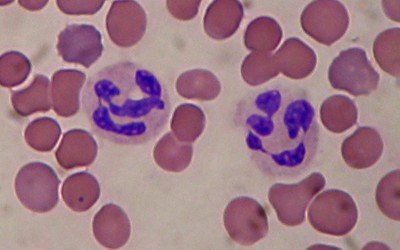Leukocytosis
What is Leukocytosis?
This is a medical condition in which there is an overproduction of leukocytes. Leukocytes are referred to as white blood cells (WBC) and are one part of the immune system. The immune system is what helps your body fight diseases and infections. White blood cells are made in the bone marrow where some are released into your blood and the rest are kept inside your bone marrow. The marrow is a spongy, soft tissue that is inside the bones. Leukocytosis can be classified into five subcategories which depend on the type of the white blood cells have increased in number.
The five subcategories of white blood cells include:
- Neutrophils
- Eosinophils
- Basophils
- Monocytes
- Lymphocytes
Leukocytosis can affect any age, gender, or sex.
Leukocytosis Symptoms
 Many times when you have Leukocytosis you may or may not have any symptoms. If you do have any symptoms they are usually caused by the disease that is causing the increase in your white blood cell production. Some of the common symptoms you could have include:
Many times when you have Leukocytosis you may or may not have any symptoms. If you do have any symptoms they are usually caused by the disease that is causing the increase in your white blood cell production. Some of the common symptoms you could have include:
- Having a high fever
- Bruising or bleeding
- Feeling tired, sick, or weak.
- Feeling faint, sweaty, or dizzy.
- Having tingling or pain in your legs, abdomen, or arms.
- Having trouble breathing
- Having trouble seeing or thinking.
- Loss of appetite
- Losing weight when you are not trying to.
Leukocytosis Causes
Generally when a person has an elevated white blood cell count it means that their body is fighting some type of infection. This infection could be caused by bacteria, fungal, a parasite, or a virus. It could also be caused by chicken pox or pneumonia. Some other causes may include:
Inflammation
This is when you see redness, swelling, or feel pain in some part of your body. It could also be caused by rheumatoid or regular arthritis, an inflammation in your joints.
Damage to your tissues
You could have an elevated white blood count if you have damage to your tissues due to burns, heart disease, and cancer.
Immune reactions
This is when the immune system reacts very strong such as when you have an allergy or asthma attack.
Problems with your bone marrow
This is when your bone marrow makes an overproduction of white blood cells such as when you have leukemia, thrombocytopenia, myelofibrosis, etc.
Medicine
Some of the medicines that can cause an increase in your white blood cells include ones that are used in treating mental health conditions, breathing problems, inflammation, and cancer. Some of these medications may include corticosteroids, aspirin, anti-seizure, lithium, chloroform, etc.
Stress
This includes both physical and emotional stress.
Medical conditions
Some of these various medical conditions can include tuberculosis, pneumonia, whooping cough, and measles.
Pregnancy
This is a very common cause of elevated white blood cells in your blood.
Urinary
If there is an elevated white blood cell count in your urine it can be caused by a bacterial infection of they urinary tract such as a bladder or kidney infection or the formation of kidney stones or other bladder obstruction.
Leukocytosis Treatment
Before any treatment can be started your physician will have to find out what is causing the increase production in your white blood cells causing you to have leukocytosis. There is a possibility that they will return to the normal range without doing any type of treatment. If the elevation is due to a medication then the physician will discontinue the medication and put you on another one.
Some treatments that your physician may use include:
Intravenous fluids – you will have a tube inserted into your veins in order to be given these extra fluids.
Antibiotics – if the cause is an infection an antibiotic will help to prevent or treat the infection. Antibiotics could help prevent you from developing sepsis. This is a very serious blood infection.
Steroids – this medication will help to reduce the inflammation in your body and may help lower your white blood cell cont.
Antacids – these are used to lower the acid in the urine while you are being treated for leukocytosis.
Anti-uric acid medications – this medication will help to lower how much uric acid that is in your body and may help prevent cell damage.
Leukocytoreduction – this is a procedure that is used to lower the white blood cells count in the blood. This may be used to slow down leukostasis. This is the disease when your white blood cells in your blood clump together.
Chemotherapy – this is the medicine that is used to treat cancer and works by killing the tumor cells.
Blood transfusions – you may get parts of or whole blood through an IV when you have a transfusion
Bone marrow transplant – your unhealthy bone marrow is replaced with healthy bone marrow and is given to you through an IV tube.